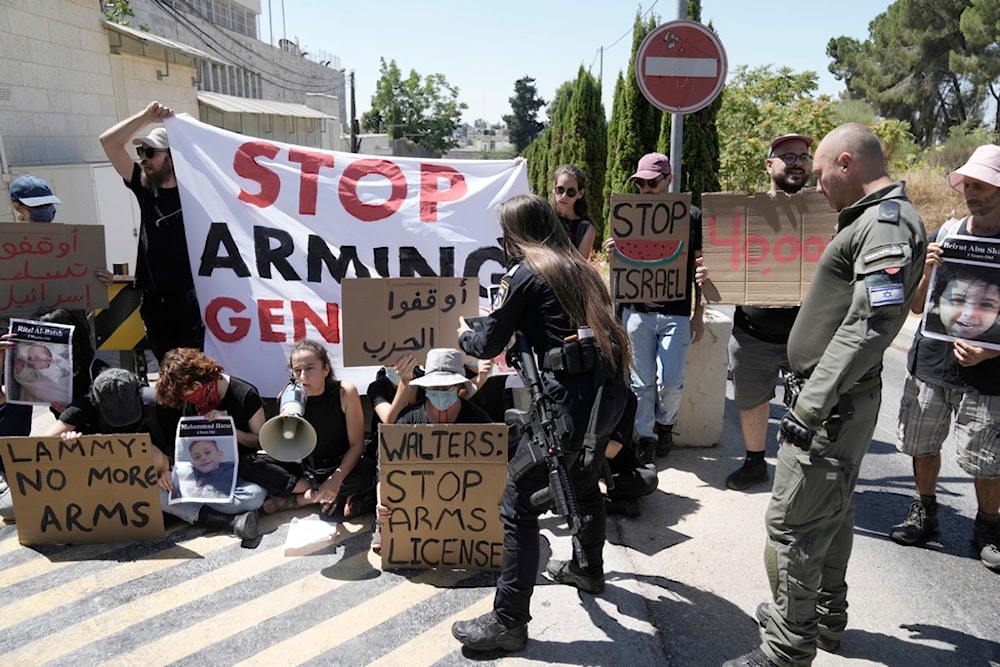18 aid groups call on UK gov. to end all arms exports to 'Israel'
While acknowledging the government's announcement of a partial ban as a step forward, the groups assert that only a total ban on all arms sales would be adequate.
-

Police clear protesters, some chained, outside of the British consulate in the eastern part of occupied al-Quds, to call on the UK to stop providing arms to "Israel" for its war on the Gaza Strip, during a visit by Foreign Secretary David Lammy and his French counterpart during internationally mediated ceasefire talks in Qatar, Friday, Aug. 16, 2024. (AP)
Eighteen aid and human rights organizations have collectively rejected the UK government's decision to suspend 30 out of 350 arms licenses for "Israel", arguing that the significant loopholes in the ban mean the UK "will remain complicit in the death and destruction that Israel’s assault has wrought on Palestinians in Gaza."
The statement called for a comprehensive ban on all arms sales, including spare parts for the F-35 fighter jet program, which it identifies as crucial to the attacks on Palestinian civilians.
While acknowledging the government's announcement of a partial ban as a step forward, the groups assert that only a total ban on all arms sales would be adequate.
The statement further criticizes "Israel’s denial of access to UN mechanisms human rights experts and journalists and its rampant disinformation against UN agencies," which it says has severely hampered efforts to document the Israeli violations.
The group of charities and organizations also expressed "deep concern" that ministers have not engaged with UK-based humanitarian organizations operating in Gaza at a ministerial level, nor sought their input on these issues.
Signatories include Medical Aid for Palestinians, Oxfam, Save the Children, Islamic Relief UK, and Amnesty International UK.
UK government announces partial suspension of arms exports to 'Israel'
On Monday, Britain announced that it would halt some arms exports to "Israel" due to a "clear risk" that these weapons could be used in serious violations of international humanitarian law.
This decision was met with mixed reactions, as Israeli Security Minister Yoav Gallant said he was "deeply disheartened", while human rights groups argued that the measures were insufficient.
UK Foreign Secretary David Lammy informed Parliament that 30 out of 350 arms export licenses would be suspended following a departmental review of "Israel's" conduct in its war on Gaza.
He stated that the partial ban encompasses items that could be utilized in the ongoing war in Gaza, including fighter aircraft, helicopters, and drones. However, he noted that the suspension does not extend to components for "Israel's" advanced F-35 stealth fighter jets.
Lammy's announcement of the arms sales review came shortly after Labour's landslide victory over the Conservatives in the general election in early July.
"It is with regret that... the assessment I have received leaves me unable to conclude anything other than that for certain UK arms exports to Israel, there does exist a clear risk that they might be used to commit or facilitate a serious violation of international humanitarian law," the UK Foreign Secretary told lawmakers.
Nevertheless, he emphasized that the suspension was "not a determination of innocence or guilt" and assured that the situation would remain under continuous review.
"We have not and could not arbitrate on whether or not Israel has breached international humanitarian law," Lammy said, adding that Britain is "not an international court," despite the International Court of Justice (ICJ) demanding "Israel" to do everything possible to prevent acts of genocide during its war on Gaza, which has left nearly 40,000 Palestinians killed.
Reaffirming the UK's support for "Israel's right to self-defense," Lammy stressed that the suspension would not have a "material impact on Israel's security."
In response, Sacha Deshmukh, Chief Executive of Amnesty International UK, described the government's decision as a belated acknowledgment of "the very clear and disturbing evidence of Israeli war crimes in Gaza."
However, Deshmukh and other human rights groups argued that the measures fell short, particularly criticizing the exemption for F-35 components as "a catastrophically bad decision," given the extensive use of these jets in Gaza.
"We need to see a complete halt -- with no loopholes, including for components for F-35s supplied to the USA for onward export to the Israeli military -- to all UK arms transfers to Israel," Deshmukh underscored.
The UK government has faced legal challenges from rights groups regarding its arms exports to "Israel", with accusations that it is disregarding its own strategic licensing criteria, which prohibit the export of weapons when there is a clear risk of their use in violations of international humanitarian law.
Read more: UK use of 'anti-terror laws' against pro-Palestinians draws backlash

 4 Min Read
4 Min Read








